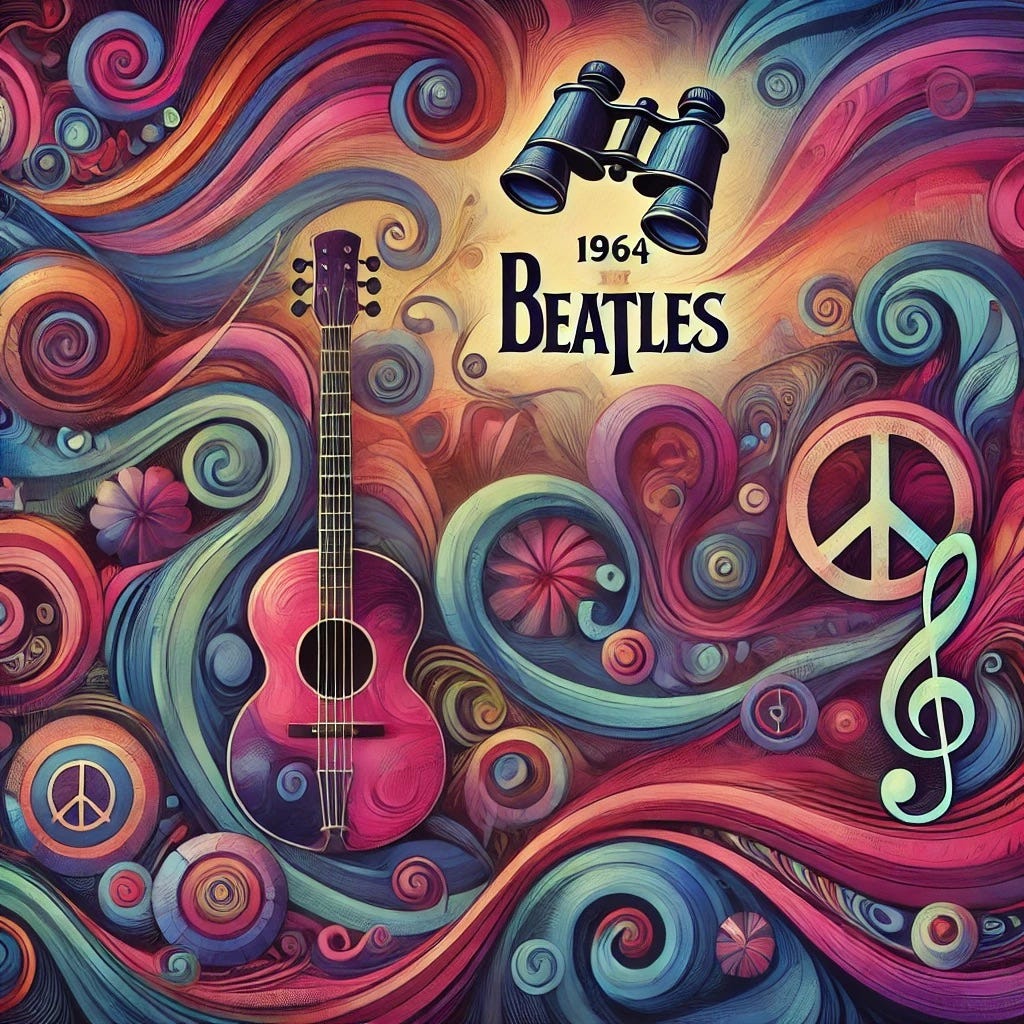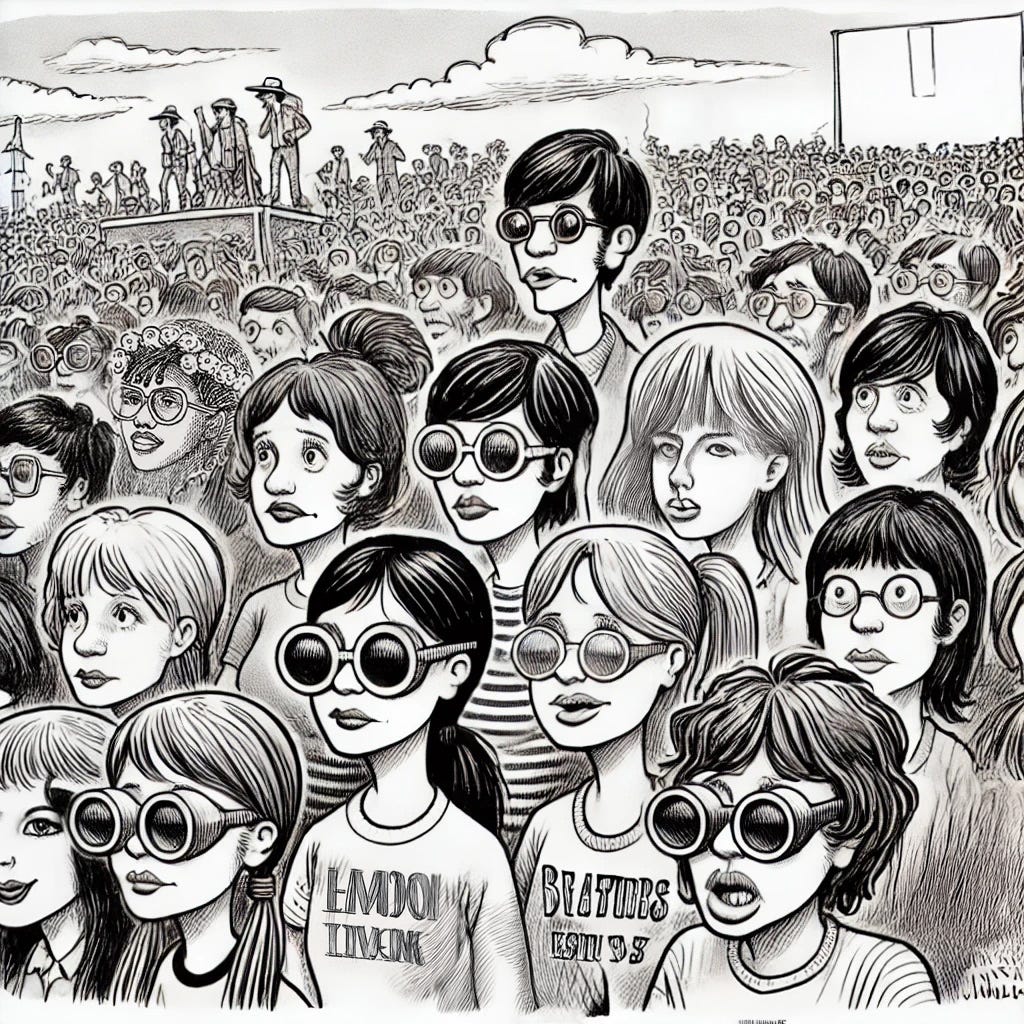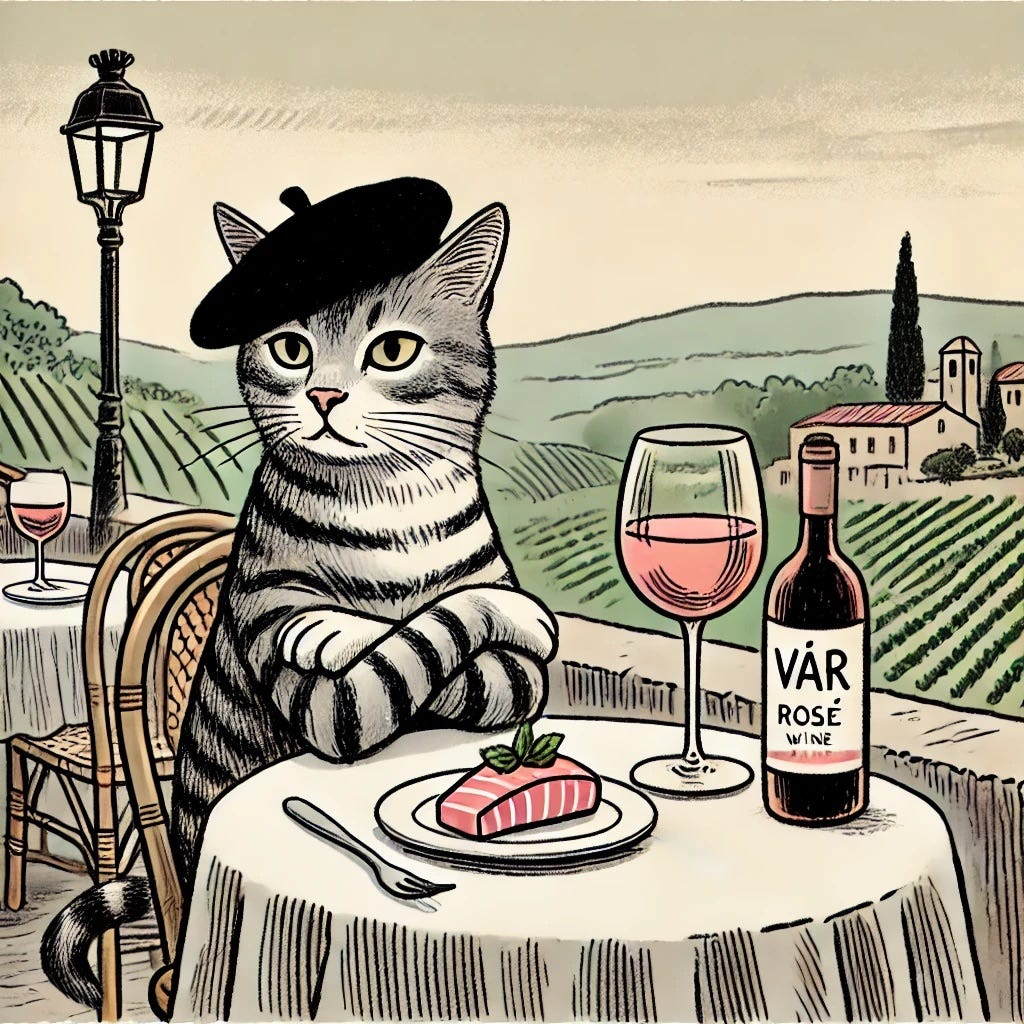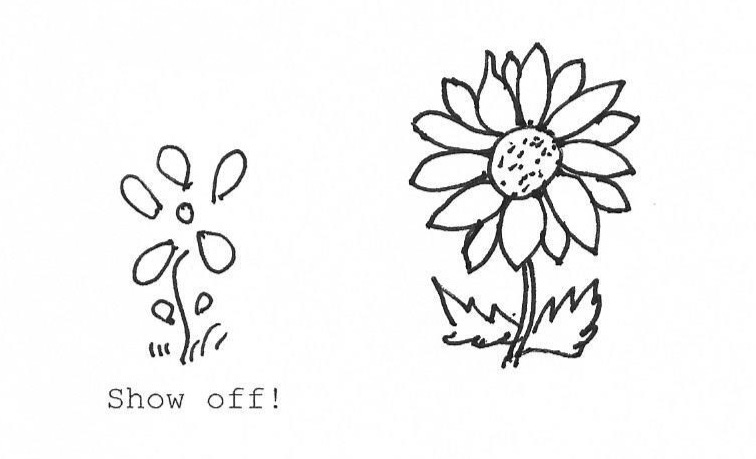NAPA VALLEY, Calif. —Aug. 19, 1964: Mr. Robinson’s white station wagon was not exactly Cinderella’s golden coach, but not one of us — four short, skinny preteens squashed in the backseat — would have traded places with her. We were headed to our own palace, the Cow Palace in San Francisco. We had the invitations — OK, tickets — to enter the enchanted kingdom of dreams that we thought might come true. We were not going to dance, precisely, but we might swoon, and we were going to see much more magnificent princes than she did: The Beatles on their first stop on their first tour in the USA.
Now, these 60 years later, I wonder what possessed Mr. Robinson to enact the role of fairy godfather and not only procure those rare tickets but also escort us there. I do not remember much else about Vicky Robinson’s dad, not his first name, for example, or what he did for a living. Only that he got us tickets and that at the end of the evening he was still laughing when we got back to Napa.
We were four friends, too: Catherine Way and I had been friends since first grade at Browns Valley School. We remained friends when my family moved across town to Coombsville Road and were reunited when her family moved, too, in the sixth grade. At Mount George I met Chris Biocca and Vicky. We all landed in what was then called “the smart class,” also known as the special class, an experiment comprising students from our school land Vichy. It went to our heads, even if my big brother insisted it was because we were all hopeless morons.
We became a quartet distinguished by the knowledge that everyone except my brother thought we were smart. And we had all watched the first American appearance of The Beatles on the Ed Sullivan Show on Feb. 9, 1964. Everyone else calls it “The Night That Changed Music Forever.” The four of us call it “The Night That Changed Our Lives.”
This was because we all identified our future husbands. A few bars of “All My Loving” had decided our fate. Chris was going to marry George, the Quiet Beatle; Vicky, whose taste was always original, opted for Ringo, the drummer; John, being married, was not an option, so both Catherine and I, in the manner of friends who shared everything, were going to marry Paul.
I felt I had a secret advantage over Catherine and everyone else who wanted to marry him: I might not be “just 17” — the vast age about which Paul sang “you know what I mean” (I had no idea what he meant) — but I was left-handed. In fact, until I saw him on “The Ed Sullivan Show” and asked my brother why he held guitar backward, I had never seen another left-handed person in my entire life. Not in my family, not in a class. And there was Paul: left-handed. He was also the best-looking.
My memories of that evening are blurred. I recall entering the vast hall of the Cow Palace and finding our seats somewhere near the roof. This didn’t worry me because I had brought my brother’s binoculars. They were hanging around my neck.
I have heard that other bands also performed that night, but I have no idea who they were. I also remember that I was determined not to join the screaming, fainting multitudes exploding in adolescent hormones all around us. I composed myself to wait quietly until The Beatles appeared in case Paul happened to glance up and notice, in the rafters several miles from the stage, the only other left-handed person in the room.
They appeared. The shrieks shook the enormous barn of the Cow Palace. Catherine, sitting next to me, leaped to her feet, screaming, “Paul! Paul!” And she grabbed the binoculars that were still hanging around my neck. Now I wonder: Would I, too, have leapt up and shrieked if I were not being strangled by my best friend? I will never know. At the time, I just thought it was a dastardly way to eliminate the competition. Now I consider it a demonstration of the power of love that makes you forget everything else, such as the fact that the person next to you needs to breathe.
But what a time it was: It had not yet been a year since President Kennedy had been assassinated. We watched again and again on television what we could not comprehend. We had no idea our country was careening off into years of confusion and upheaval that have brought us to the confusion and upheaval reverberating today. But for those minutes in the Cow Palace, we all knew a wild and crazy joy — especially me, when I could breathe again.
And in time, Paul faded, eclipsed by reality, local guys. Also he got married; and I don't even know if his wife was left-handed. When we graduated from Napa High, Catherine went to Davis and I to Berkeley. She was the maid of honor when I got married. My children and I went to her wedding when she met the love of her life on the internet we could not have imagined when television was still a magical thing. The years since 1964 have been rich with adventures, love and loss.
I recently got an email from her asking if I would be free for lunch on Aug. 16. I will have to reply that I am going to a concert that night (New Music at Napa Valley College). “But how about Aug. 19?” I’ll say — and see if she remembers. I won’t be wearing binoculars.
If today’s story captured your interest, explore these related articles:
Sunday E-dition: End-of-Life Planning for Peace in Challenging Times
Sunday E-dition: Retired Judge Brings Real Napa Valley Crimes to Life
Sunday E-dition: WineaPAWlooza Raises $1.1 Million for Animals
Disasters Impact Pets: Jameson Humane to Host WineaPAWlooza Fundraiser
Sasha Paulsen is a Napa Valley-based novelist and journalist.
Levity Corner
Caption contest: Pick your favorite caption or add your own in the comments below.
Possible captions:
""When you see your crush and suddenly everyone's in the way."
"Spot the fan who thought this was a silent disco."
"When the fandom is bigger than your field of vision."
"What do you mean 'Paul is taken'?”
“We’ll just wait until after everyone leaves to say hi.”
Last week’s winner
In "Sunday E-dition: Sipping Through the Var's Rosé Region,” the winning caption was "Mere mortals wouldn't understand,” with 36% of the votes.
Last Week
Tim Carl reported in "Under the Hood: As Americans Sour on Alcohol, Napa Valley Grapples With an Uncertain Future" that a recent Gallup poll reveals growing skepticism about alcohol's health effects, particularly among younger generations. With more Americans viewing alcohol as unhealthy, Napa Valley's wine-centric economy faces significant challenges. The poll shows a decline in overall alcohol consumption, with younger adults increasingly avoiding wine in favor of other beverages. As the industry relies heavily on an aging demographic of affluent women, the future sustainability of Napa Valley’s wine market is uncertain, prompting some wineries to explore lower-alcohol and nonalcoholic options.
Georgeanne Brennan wrote "Sunday E-dition: Sipping Through the Var's Rosé Region," in which she shared her journey through the Var region of Provence, France, exploring its renowned rosé wines. Brennan recounted her history with the region, having bought a farmhouse there in the 1970s, and described the transformation of rosé wine from a less-popular choice to a globally celebrated variety. She highlighted the diversity of the Var's terrain and its major appellations, including Bandol and Coteaux Varois en Provence, noting the unique characteristics and grapes such as mourvèdre and grenache that define the local wines. Brennan's exploration included visits to local wineries and restaurants, where she paired regional wines with traditional dishes, capturing the essence of Provence's vibrant wine culture.
Earlier, Tim Carl's "Under the Hood: Climate Change's Growing Impact on Napa Valley" focused on how climate change is affecting the people of Napa Valley, emphasizing challenges beyond viticulture. While grapevines are resilient, Carl highlighted how increasing wildfires, rising temperatures and water scarcity threaten the livelihoods and quality of life for residents, workers and visitors. These changes impact outdoor activities and tourism, vital components of the local economy. As climate change exacerbates extreme weather conditions and degrades the environment, the community faces health risks, job insecurity and economic pressures, necessitating adaptations in business practices and daily life to sustain the region’s vibrant culture and economy.
"Dan Berger’s Wine Chronicles: Wine Private Labels" discussed the growing trend of private-label wines in response to the economic challenges facing the California wine industry. With a slowdown in wine sales leading to surplus inventories, wineries are increasingly turning to private labels, offering high-quality wines at lower prices to move stock. This shift mirrors the practice in Bordeaux of producing "second" wines, which are more affordable yet still maintain quality. Berger highlighted how retailers such as Trader Joe's have successfully leveraged private-label wines, benefiting both the wineries, which can purchase large quantities of grapes at reduced costs, and consumers, who can access affordable wines. As the industry faces pressures from the recent bankruptcy of Vintage Wine Estates and potential discounting of its brands, private labels offer a solution to navigate economic uncertainties.
In "Invasive Plants: A Gardener’s Guide to Control," Cindy Watter recounted her experiences managing invasive plants in her Napa Valley garden. Watter described her struggle with lemon balm, a prolific member of the mint family that quickly takes over garden spaces, necessitating constant trimming and removal. She also discussed the challenges posed by wild onion lily, which requires persistent effort to control, and catchweed bedstraw, which rapidly spreads and entangles other plants. Watter noted that, unlike these more troublesome species, the passionflower vine, while invasive, is a welcome addition due to its aesthetic appeal and ability to attract butterflies. Through these experiences, she highlighted the balance between appreciating and managing the spread of invasive plants.
Tim Carl reported that Schramsberg Vineyards marked the start of its 60th harvest with a traditional sabering ceremony, where Hugh Davies and his team sabered bottles of sparkling wine to celebrate. In "Schramsberg Marks 60th Harvest With Sabering Ceremony," the event highlighted the winery's evolution from its 19th-century roots to its current status as a leader in American sparkling wine. The harvest began with pinot noir from the Richburg Vineyard, a reliable source for over 20 years, and included participation from the third generation of the Davies family. The ceremony underscored the vineyard’s commitment to history, quality, and family tradition.
Kathleen Scavone explored the abundance of blackberries in Napa Valley in "Weekender Encore: Nature’s Sweet Treasure — The Blackberries of Napa Valley." She noted that last winter's rains led to a prolific crop of Himalayan blackberries, which thrive across the region and are enjoyed by both humans and wildlife. Scavone contrasted these invasive berries with the less common native California blackberry, highlighting the ecological impact and cultural significance of both varieties. She also touched on traditional uses of blackberries by Indigenous peoples and offered simple culinary ideas for enjoying the seasonal fruit.
Next Week
Next week we have more interesting articles from a host of Napa Valley Features contributors. The Master Gardener series on Wednesday will provide gardening insights, while Dan Berger will focus on wine topics on Thursday. We’ll hear from Kathleen Scavone about sudden oak death, a new contributor and Sasha Paulsen, too. Carl will explore a collection of economic indicators. Plus much more.









Sasha, I always love reading your stories! Thank you
Sasha,
Your article brought me back to that magical time I saw The Beatles with my best friend. I saw them Aug. 28, 1966 at Dodger Stadium. I was 13, my friend was 15, and we bribed a friend of her brother's to drive us there by buying him a ticket! Tickets were $6.00 (at least ours were), but it cost us each a whopping $9.00 each to buy his ticket too. I can remember doing all kinds of extra chores to earn enough money, as that was a small fortune to me. All these years later, I am so happy we did that! Thanks for the memories!